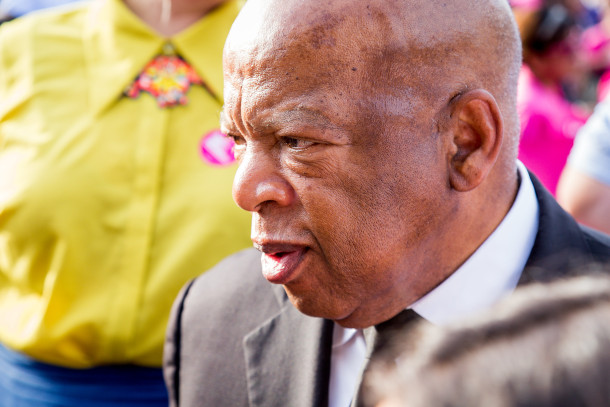Beyond the Headlines
Air Date: Week of July 24, 2020

Civil rights advocate and Congressman John Lewis passed away on July 17, 2020. He was also known as an advocate for environmental justice. (Photo: Mobilus In Mobili, Flickr, CC BY-SA 2.0).
In this week’s Beyond the Headlines, Environmental Health News Editor Peter Dykstra joins Host Bobby Bascomb to discuss the environmental justice legacy of John Lewis, civil rights leader and Congressman. They also cover the possible lasting impacts of low ridership on public transit due to the pandemic.
Transcript
BASCOMB: It's time for a trip now beyond the headlines with Peter Dykstra. Peter's an editor with Environmental Health News. That's ehn.org and dailyclimate.org. Hey there, Peter, what do you have for us this week?
DYKSTRA: Hi, Bobby. And for very good reasons we've heard so much in the form of tribute about the late congressman John Lewis. Most of it has focused on things other than the environment. But, I think we owe a little tribute to John Lewis, because he was a steadfast advocate of environmental laws and environmental justice.
BASCOMB: And I believe we have a bite of the late John Lewis to play here. Let's have a listen.
LEWIS: Combating climate change is not a Democratic or Republican issue. It is the question of preserving this little piece of real estate that we call Earth for generations yet unborn.
BASCOMB: Now, he was a 17-term congressman from Georgia, right? Tell me more about his environmental justice legacy.
DYKSTRA: He's - from the very beginning - we're talking about more than three decades ago, Congressman Lewis sponsored environmental justice legislation, he spoke as passionately about pollution in poor and minority communities, as he did about any other aspect of civil rights. Overall, his League of Conservation Voters score in 17 terms in the House of Representatives was 92%. That's a pretty remarkably high number for so long, with a congressman that was involved in so many other things beyond the environment.
BASCOMB: And I understand that you actually bumped into him a few times since you live down in his region.
DYKSTRA: Right. When I first moved to Atlanta, John Lewis was my congressman. And since then, I've run into him on planes, in airports, at events, and I was just blown away that someone so prominent, a big politician and a celebrity, actually cared what I was saying to them. At one point, John Lewis was listening to me so intently and caring about things that he almost missed this flight back to Washington. He's a guy who really cared. I've heard so many similar stories about him. And there are few, if any, that are his match in Congress, or in any phase of government.
BASCOMB: Such a loss, but what a legacy he leaves behind. Well, what else do you have for us this week, Peter?
DYKSTRA: A lot of folks have talked about greenhouse gas emissions being sort of the tiny silver lining in the toxic cloud of Coronavirus, because with so many people sheltering at home, so many people not going to work, travel is way down in the era of Coronavirus. But, that might be canceled out by an equally dramatic drop in mass transit ridership.
BASCOMB: Hmm, that's true, I suppose. Fewer people are commuting to work on the train and bus and things. What's that going to mean going down the road in the future when we do want to get back to work?
DYKSTRA: Well, with fewer people crowding into trains, and you can understand with Coronavirus why people are avoiding crowds like that, they're also just not going to work as you said. But according to Inside Climate News, this could trigger some massive cuts in federal aid since some federal aid money is largely pegged to ridership numbers.

With fewer people taking public transit, federal funding could be cut for public transportation in the U.S. (Photo: Alexander Rentsch, Flickr, CC BY-NC-ND 2.0)
BASCOMB: Ah, so you're gonna see a drop in financial support for public transit. I mean, that's gonna lead to what, cuts in services, I would guess.
DYKSTRA: Cuts in services, some bus lines may be cut out completely. A couple examples - out in the San Francisco area, BART- Bay Area Rapid Transit - runs trains and buses. They anticipate a half billion dollar loss in federal funding. While across the country in New York City with its massive mass transit system, they expect a $10 billion cut. That's billion with a "B".
BASCOMB: Hmm, that's huge. That's a huge amount of money. Peter Dykstra is an editor with Environmental Health News. That's ehn.org and dailyclimate.org. We'll talk to you again real soon.
DYKSTRA: All right, Bobby, thanks a lot. Talk to you soon.
BASCOMB: And there's more on these stories on the Living on Earth website. That's loe.org.
Links
COLORLINES | “EPA Pays Tribute to Rep. John Lewis and Environmental Justice”
Living on Earth wants to hear from you!
Living on Earth
62 Calef Highway, Suite 212
Lee, NH 03861
Telephone: 617-287-4121
E-mail: comments@loe.org
Newsletter [Click here]
Donate to Living on Earth!
Living on Earth is an independent media program and relies entirely on contributions from listeners and institutions supporting public service. Please donate now to preserve an independent environmental voice.
NewsletterLiving on Earth offers a weekly delivery of the show's rundown to your mailbox. Sign up for our newsletter today!
 Sailors For The Sea: Be the change you want to sea.
Sailors For The Sea: Be the change you want to sea.
 The Grantham Foundation for the Protection of the Environment: Committed to protecting and improving the health of the global environment.
The Grantham Foundation for the Protection of the Environment: Committed to protecting and improving the health of the global environment.
 Contribute to Living on Earth and receive, as our gift to you, an archival print of one of Mark Seth Lender's extraordinary wildlife photographs. Follow the link to see Mark's current collection of photographs.
Contribute to Living on Earth and receive, as our gift to you, an archival print of one of Mark Seth Lender's extraordinary wildlife photographs. Follow the link to see Mark's current collection of photographs.
 Buy a signed copy of Mark Seth Lender's book Smeagull the Seagull & support Living on Earth
Buy a signed copy of Mark Seth Lender's book Smeagull the Seagull & support Living on Earth

